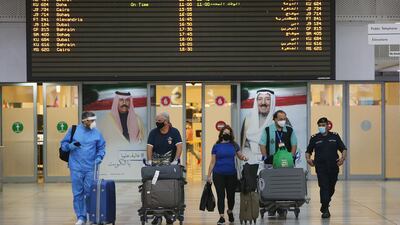Kuwait has reopened to international travel, but flights from 31 countries deemed to be high risk will not be resumed.
The country started receiving commercial flights on Saturday after a five-month suspension because of the coronavirus pandemic.
But Kuwait’s Directorate General of Civil Aviation extended the ban on commercial flights from “high-alert countries”, such as those with many active Covid-19 cases.
The list includes: Iran, Iraq, Lebanon, Pakistan, India, Egypt, Bangladesh, Philippines, China, Nepal, Brazil, Colombia, Armenia, Syria, Spain, Singapore, Bosnia and Herzegovina, Sri Lanka, Mexico, Indonesia, Chile, Hong Kong, Italy, North Macedonia, Moldova, Panama, Peru, Serbia, Montenegro, the Dominican Republic and Kosovo.
Restrictions on travelling to Kuwait
The country has also put strict regulations in place for airlines and travellers.
Flights into the country can operate at a maximum capacity of 30 per cent, and no more than 10,000 travellers can arrive in Kuwait each day.
The number of flights is capped at 100 per day.
Travellers must stay in quarantine for two weeks on arrival and have travel health insurance that covers treatment for Covid-19, said Yousef Al Fawza, the aviation authority’s director general.
The restrictions are expected to stay in place until February 1, next year, when a second phase will begin. Then, services will be able to operate at 60 per cent capacity, with daily passenger and flight numbers capped at 20,000 and 200 respectively.
Looking forward, the aviation body has announced a third and final phase, which will start on August 1, next year. Flights will be able to land in Kuwait at 100 per cent capacity, with a maximum of 30,000 passengers per day and 300 daily flights.
On Sunday, Kuwait had 67,911 confirmed cases of Covid-19 since the outbreak began, including 457 deaths.


